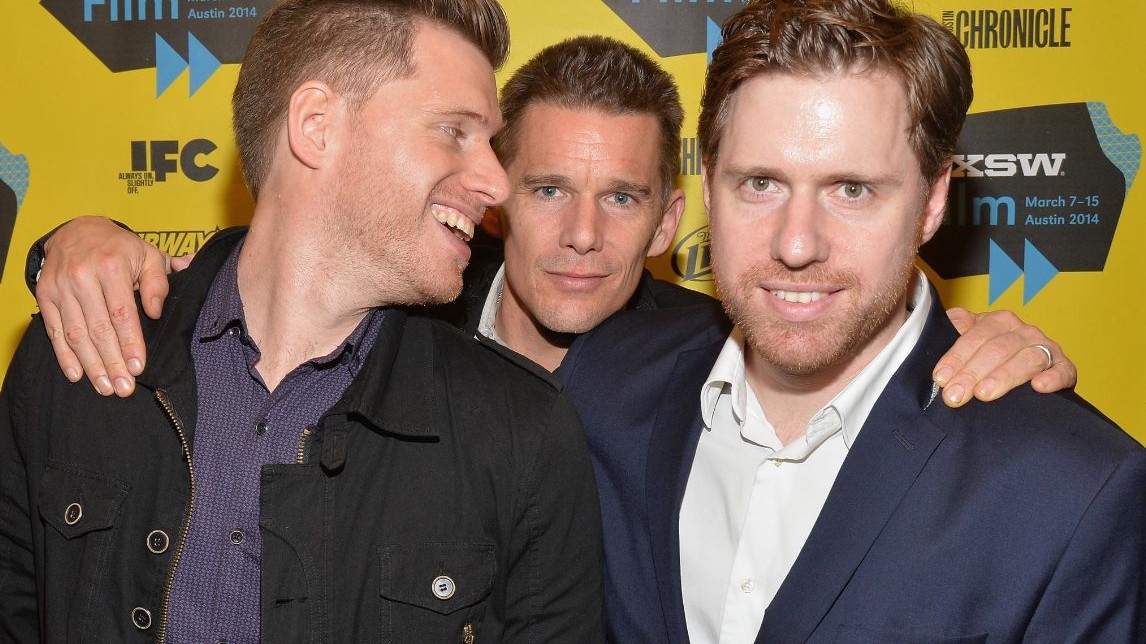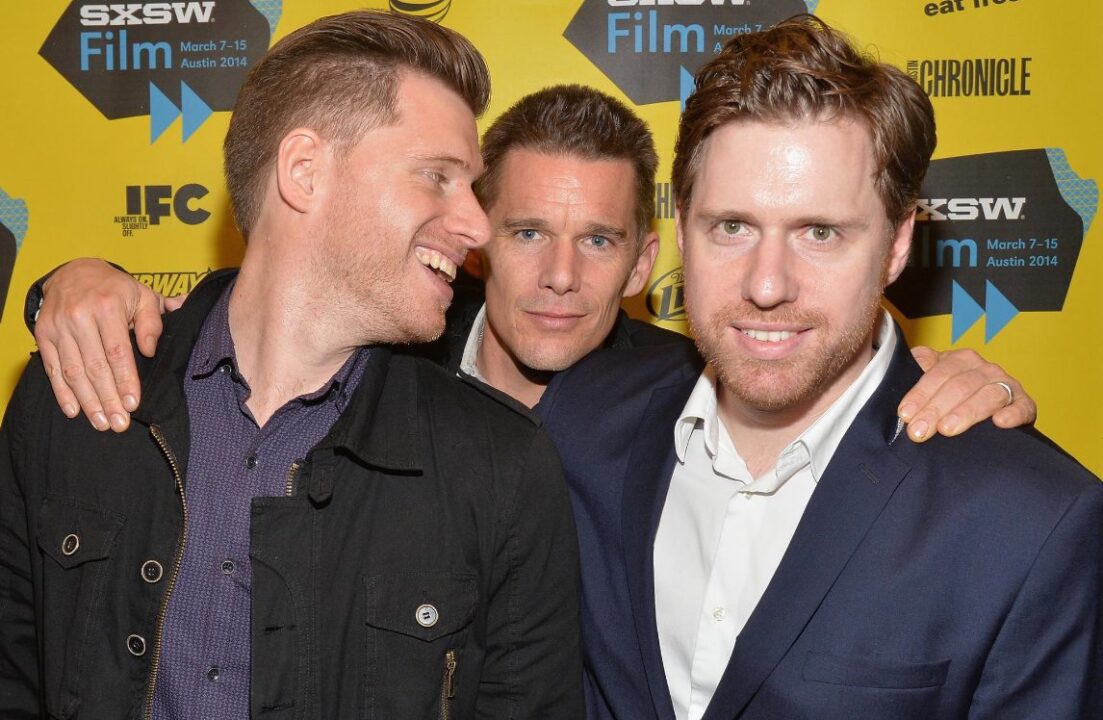Directing duo Peter and Michael Spierig sat down with our contributing writer Jasper at the SLS Hotel for an intimate conversation about their new sci-fi film, Predestination. The film, which is based on the short story “All You Zombies” by Robert A. Heinlein, tells the story of a temporal agent, played by Ethan Hawke, who travels through time to prevent future killers from committing crimes. Part action film and part thriller, Jasper talks to the brothers about their cinematic inspirations, their collaboration with Hawke, and working with family. We begin:
ARE YOU A FAN OF HEINLEIN AND SCIENCE FICTION IN GENERAL?
PETER SPIERIG: Absolutely. It’s funny that Heinlein hasn’t been adapted more. Because he has such a massive catalog of amazing thing like Starship Troopers, which has been adapted, but also ‘Stranger in a Strange Land’ or ‘Moon Harsh Mistress’ and a lot of interesting novels that have not been attempted yet. I love all the old sci-fi guys.
THE SHORT STORY IS VERY DENSE. WHAT WERE THE BIGGEST CHALLENGES OF ADAPTING IT INTO A FILM? OBVIOUSLY YOU ADDED ANOTHER MAIN CHARACTER, SO TALK ABOUT THAT PROCESS.
P: We initially took the short story and put it into a screenplay just to see what it was in that format and then began to really break it down and say, ‘Okay, how does this go from a ten-page short story into a 110-page feature screenplay.’ You do that by thinking about structure and the way the characters interacts. And the great thing about adapting a short story as opposed to a novel is you get to expand rather than contract. With a novel you have to pull out so much and people complain a lot that it was never as good as the novel then when they see the movie. So, that was fun to be able to expand the characters. because the concepts were so interesting, but the characters weren’t fleshed out all that much. The other thing about the short story is that is it just a setup and a payoff. It’s almost a joke about how time travel can’t exist, so we really wanted to expand that and make the characters more complete.
HOW LONG WAS THE ORIGINAL SCREENPLAY?
P: It was about 30 pages. [laughs] So it was a tremendous amount of work.
IT SOUNDS LIKE ETHAN REALLY RESPECTS YOUR VISION-
MICHAEL SPIERIG: He said that? [laughs]
I remember we always watched the movies we weren’t supposed to and our parents never stopped us from watching The Exorcist or Evil Dead or any of those films and that’s sort of a big influence on us.
WITH ETHAN AND SARAH [SNOOK], DID YOU GO OFF EACH OTHER CREATIVELY OR TAKE SUGGESTIONS FROM THEM?
M: Yeah. Now that this is our second picture with Ethan, I think we’re more open with each other. There’s various versions of the rehearsal process. You can sit there and run lines over and over again, but that’s never the best thing to do. The best thing to do is to get together with the actors and just talk through the intention of each moment, each scene and what you are trying to get out of the scene. We had a very relaxed and sharing rehearsal process and I think that helped to create the natural feel of the bar scenes. Everyone was very open and it was a lot of fun.
WHO INSPIRED YOU TO GET INTO FILMMAKING?
M: We grew up in the 80s and its hard to not be inspired by Star Wars and Indiana Jones, you know, the Spielberg, Lucas stuff and James Cameron. But we also loved the early Sam Raimi stuff and closer to home, Peter Jackson, when he was doing his low-budget splatter movies. What was great about that is that were made on a shoestring. For us, it was amazing that a guy from Wellington was making these types of movies. And there are filmmakers like Kubrick –
I REALLY SAW STANLEY KUBRICK A LOT WHEN I WAS WATCHING THE FILM.
M: Yeah, I often like directors who a little out there like David Lynch and David Cronenberg. They are two of my favorites. I really enjoy films that are a bit weird.
P: We definitely grew up in the early days of VHS. I remember we always watched the movies we weren’t supposed to and our parents never stopped us from watching The Exorcist or Evil Dead or any of those films and that’s sort of a big influence on us.
IT SEEMS LIKE YOU TOOK THAT INFLUENCE AND USED PRACTICAL SECIAL EFFECTS RATHER THAN GOING WITH CGI. I REALLY APPRECIATED THAT.
P: If we can do it practically, then that’s the way to do it.
M: We were saying this is our anti-CGI movie, but there is still 200 digital effects in Predestination. I get bored by CGI. A CGI thing fighting another CGI thing; it just loses all humanity for me. So we tried to do an anti-CGI movie.
P: Until we get $200,000,000 dollars. [laughs]
WOULD YOU GUYS WANT TO DO A BIG EFFECTS MOVIE?
M: Of course! It just depends on what it is. But, of course, if the project’s right, why wouldn’t you?
P: There’s a lot of good Marvel movies out there. There’s plenty of good $200,000,000 movies. But there are also plenty of films that you think are just a bunch of noise, as visual and audio.
M: We just want to work. To be a filmmaker now days is just so tough, so we’re just happy to have a job and happy we get to make the films we want to make.
AND YOU GUYS DO EVERYTHING. YOU WEAR ALL THE HATS. YOU’RE PRODUCER, DIRECTOR-
M: To some degree. We have a team of people that we work with. We do have producing partners. It’s like a family of crew: DP, designers, the effects people. Its all people we’ve known for a very long time. So it is like a family when we shoot our films.
YOU HAD A PRETTY SHORT SCHEDULE ON THIS ONE TOO.
M: 32 days or something like that. It’s quick, but so much of it took place in the bar. It’s almost like shooting a play. You can get so much done quickly. To shoot quick you’ve got to prepare well.
For our review of Predestination, click here.
SO ARE BOTH ON SET ALL THE TIME?
M: Yeah. We have split up and shot two units, but on this one we we both on set at the same time. People always ask us “How does that work?” And I think its a hard one to explain because we do so much preparation before we start shooting – we storyboard and we really test everything. Things don’t change when we start shooting, so I don’t go off and say one thing and Peter goes off and says another.So it’s pretty much 50/50 as we direct.
ARE YOU THINKING OF MUSIC WHEN YOU’RE WRITING, PETER?
P: I did. On this one in particular I had this audio track in my head when we were writing and this was the first time I’ve been able to translate the sounds that I heard onto screen. The scariest part of the whole movie was writing the score. If we get it all write up until the point where the music comes in, then I’ve ruined the movie right at the end.
M: It was such a different process because normally when you edit a movie, you put a guide track of music or temp track. You might use a Jerry Goldsmith track that you put in. With this, Peter was writing the music as we were editing so he would always have guides that we were thrown in so the film was being cut to the music we were going to use.
P: Which meant the film never had somebody else’s sound. Often what can happen when you put a temp track in is that you become so attached to this million-dollar score –
M: And then you get the worst composer. [laughs]
P: I made my temp tracks crap. [laughs]
DID YOU DO A LOT OF CASTING FOR THE JANE/UNMARRIED WOMAN ROLE?
P: That was a big search. We did the traditional thing which is to do a casting for every interesting actress in Australia and we looked at everybody. We knew of Sarah Snook and we knew the kind of talent that she was. She came in and auditioned, and we shortlisted a bunch of girls. It came down to two girls and we did makeup tests on those girls as a man because as good as they were we still need to see that to make sure that it would work. And Sarah was fantastic. She’s going to do alright that girl.
WHEN DID YOU BRING ETHAN IN?
M: He was the first person we had spoken to about the movie. We has spoken to him before we even to the film out to market. I remember it was one or two day after we handed him the script and he said, “I’m in.” And what that does it that it immediately legitimizes the project. We can now really get going and get the rest of the financing.
P: There’s something wonderful about Ethan though because he didn’t know who Sarah was, but he just trusts us. He said, “Do you guys believe in this girl? You think she can do it?” Yeah. “Then lets do it.” And it’s very rare that you can find an actor who will have faith like that. He’s wonderful in that he’s brave. “Okay, I trust you guys, let’s do it.”
IT SAYS A LOT ABOUT YOU TWO, THAT YOU CAN HAVE SOMEBODY TRUST YOU THAT WAY. WHAT IS IT THAT YOU DO TO CREATE THAT TRUST?
P: Well I think that we’re pretty open and honest about things. We’re not pulling the wool over anyone’s eyes. We say “This what our intention is. This is what we want to do.” We talk about it great detail. I mean that’s the thing about Michael and I is that we are very detail oriented. Maybe that’s our German background, I don’t know. We make it a collaborative process. We are hiring good people, we want to hear what they have to say. We’ll absolutely take credit for it, but we want to hear what they have to say because they’ll come up with an idea that we would have never thought of and it just makes the movie better. So on Daybreakers, I think Ethan saw what we wanted to accomplish was on screen. I think that builds that kind of trust.
WHAT DO YOU HAVE PLANNED FOR YOUR NEXT MOVIE?
M: We have a project called Winchester which is based on the Winchester Mystery House in San Jose. We just delivered a screenplay on that one. It’s about Sarah Winchester. She’s the heir to the Winchester rifle fortune and she built this mansion in San Jose and believed that she was haunted by all the spirits who were killed by the rifle. This house is supposed to be haunted by all the spirits, so she would build all these rooms and these stairs that go to nowhere and doors that open to two-story drops to confuse the spirits. It’s an amazing story and we’re working on that at the moment.
Jasper Bernbaum
Jasper is a contributing writer for Cinemacy. He combines his love of music with his visual eye into a passion for live photography. He holds a BFA in Film Production from Chapman University and is an avid filmmaker, watcher, and all around cultural adventurer.




